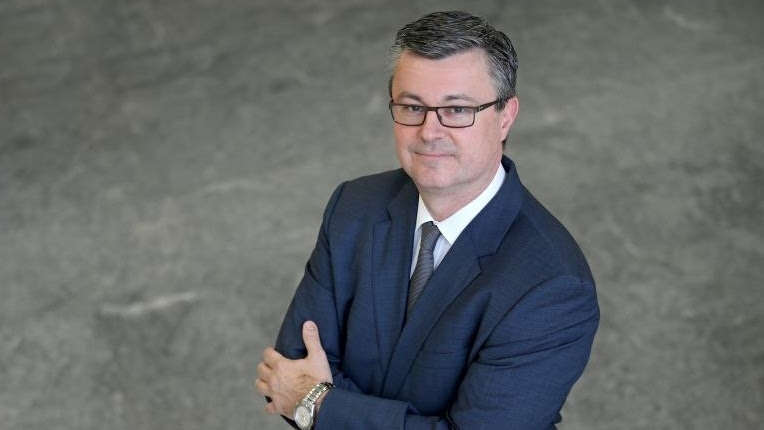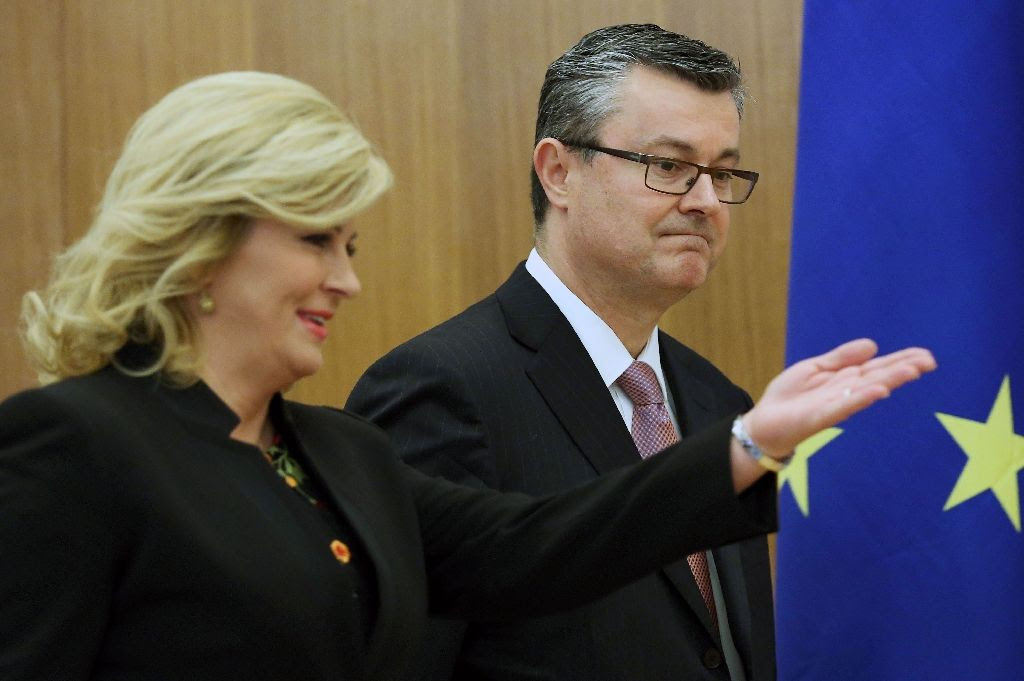
Croatian President Kolinda Grabar-KItarovic (left) and
Tihomir Oreskovic, Croatian Prime Minister Designate (right)
23 December 2015
Photo: AFP
For at least half a decade the European Union has seen the emergence of technocrat governments, non-elected professionals installed in government portfolios as the answer to all economic woes and problems of small and large countries, alike. We’ve seen Italy and Greece lead the way in technocrat government machinery and yet not much has been achieved in the betterment of those calamitously deteriorating economies and societies. The latest example of installing a technocratic government is occurring in Romania and will reportedly signify a dramatic stepping up of austerity measures directed against the country’s working class. Although we do not know the make-up of the new government of Croatia, because it is to be formed during the coming month, speculations are high that much of it may reflect appointments of non-elected, non-political professionals in various fields. The appointment of an non-elected professional as Prime Minister has given rise to such speculations.
One would hope that the act of appointing a non-elected professional as the new Prime Minister designate of Croatia does not translate into a possibility where democracy is regarded as merely an optional extra when solving economic problems. The President of Croatia Kolinda Grabar-Kitarovic has Tuesday 23rd December, commensurate with the proposals made by the conservative HDZ-led coalition and the reformist coalition of independents – Most/Bridge - named Tihomir Oreskovic as the Prime Minister designate of Croatia, giving him 30 days to form the new government.One thing that became blatantly apparent is that the Most (Bridge) coalition had almost overnight ditched its insistence on forming a tripartite government that would include practically everyone who was elected into parliament and struck a deal with the centre-right HDZ/Croatian Democratic Union, dropping centre-left Social Democrats like a hot potato. While I have always maintained that a tripartite government was not a good thing and should be avoided at any cost the fact remained that the Most/Bridge coalition had tortured the Croatian public with the idea for almost 6 weeks and has not, to my knowledge, offered a satisfactory explanation as to why it had moved away from the idea so quickly!

Tihomir Oreskovic
Prime Minister Designate of Croatia
Photo: Igor Kralj/Pixsell
The Croatian public or voters do not know Mr Oreskovic, generally, however, he is reported as well known to the business circles as a highly skilled professional in business management. Mr Oreskovic come to the position of Croatia’s Prime Minister from abroad and is considered a most worthy son of Croatian diaspora. Born in Croatia, Zagreb, 1966, currently residing in Amsterdam, Tihomir or Tim Oreskovic is a Croatian-Canadian pharmaceutical and well reputed financial expert who is said to have earned his Batchelor of Science in Chemistry from McMaster University, Canada in 1989, and a Master of Business Administration/MBA in finances and IT in 1991 at the same University. He comes to Croatia from his position as Chief Financial Officer for Teva Pharmaceutical Industries global generic medicines business, had previously served as CEO and Chairman of the Supervisory Board of Pliva (Croatia’s national pharmaceutical company), and was also head of financial management for Teva in Europe. He holds dual Croatian and Canadian citizenship. His relatively poor command of the Croatian language surfaced at the time of his first address as the Prime Minister designate. As one would expect, this sent media and other tongues wagging in all directions – after all he did spend his formative years growing up in Croatia and had also worked for Pliva and Teva in Croatia for a few years and the apparent lack of expressive language fluency in the Croatian language has ignited a raft of speculations about his authenticity, political and democratic legitimacy to lead the country as Prime Minister, business dealings such as the sale of Pliva to Teva and the issue of Teva extracting millions from Croatia reportedly without paying taxes … The former Social Democrat, centre-left, Prime Minister Zoran Milanovic reacted to Oreskovic’s nomination as PM with particular bitterness saying that only two people in Croatia possess the legitimacy to be the Prime Minister – he, himself and the centre-right leader Tomislav Karamarko. He alluded to theelectoral results that yielded the conservative HDZ 59 out of 151 seats and 53 out of 151 seats to Social Democrat Zoran Milasnovic.Tongues will wag always but, at the same time, one thing is also certain: Oreskovic has had an exemplary and positive career in business administration and development and while seemingly a man of few words he has been known, while working at saving Croatia’s Pliva from bankruptcy, to criticise strongly Croatia’s bureaucracy and business-unfriendly red tape. Oreskovic is said to have no political experience and some media in Croatia consider that a disadvantage in a Prime Minister. The same media chooses to ignore the fact, it seems, that Mr Oreskovic does not need to have any political experience as PM designate – he was appointed the PM because he is not a politician by occupation but a proven solid business administrator. He as a technocratic Prime Minister has no direct accountability to the Croatian public because the same public did not vote him in. He is directly accountable to the elected politicians who appointed him to carry out the work they evidently judged they themselves could not do, and in turn, they are accountable to the public/voters. The elected politicians, regardless of which side of politics they subscribe to will be the ones to call such a Prime Minister to account. Whether Croatia will become a country with a government of technocrats, by technocrats, for the technocrats is anyone’s guess but certainly there is a trend of appointing non-elected professionals into government portfolios in countries where the economy seem to be drawing its last breaths before bankruptcy. Croatia’s foreign debt stands at 90% of GDP and that is riding close to death or affliction from which there is little hope of recovery any time soon. Croatia needs a stable and a knowledgeable government as the past four years have been particularly ineffective in battling foreign debt and the plummeting of living standards, soaring of unemployment. It needs to tackle the grim fiscal woes and high public debt as well as pave the way for much more investment than has occurred, especially in the private sector. The Unions in Croatia have already expressed a certain discomfort with the austerity measures that seem to be on the table under Oreskovic’s leadership and fear that Oreskovic will “easily dismiss the interests of the common people over the interests of the circles he is coming from. But the good news is, because he openly represents large capital and its interest, that is much better than what we had in the last four years - representatives of the very same capital but under the mask of social democracy", said Vilim Ribic from the Independent Union of Research and Higher education.“I have concluded the last round of consultations. At the very end of this process, Mr Orešković convinced me that he has the support of 78 parliamentary deputies and proved it with their signatures. Therefore, in accordance with my constitutional duty, I hereby give him the mandate to constitute the new Government. I am scheduling the constituent session of the Parliament for December 28, 2015 at noon” President Kolinda Grabar-Kitarovic announced.

Tihomir Oreskovic
"I'll invest all my knowledge and energy so that we can start solving the huge number of problems that we have," Oreskovic said after his nomination.“I will invest all my knowledge and effort to form a good government and to start resolving this country’s problems. I invite the parliamentary majority and the opposition to support me on that quest, I know we don’t have time for the standard 100 days and I am not asking for them. Our only goal is to work together towards a better future for all of us”.Evidently, Oreskovic appears ready to roll-up his technocratic sleeves and make a positive difference to the Croatian economy. He deserves all the support he can get in this. The centre-left Social Democrat leader’s, Zoran Milanovic (former PM), declaration that Oreskovic has no democratic or political legitimacy to serve as Prime Minister is surely a definite sign of political incompetence on Milanovic's part. For countries suffocating in debts and economic crises – such as Italy and Greece and now Romania, to mention only some, democratic legitimacy in terms suggested by Croatia’s former Prime Minister Milanovic is clearly regarded a luxury such countries cannot afford. A leader of a government or its minister do not need to be democratically elected members of the parliament, they do, however, when appointed by elected members of parliament, need to be efficient in implementing the job and achieving the outcomes specified through election promises by elected members of parliament.The rather loud message coming out of Brussels is that international bodies (e.g. IMF, European Commission) believe that democratically elected governments have failed to tackle and overcome the economic crisis and should be replaced with more reliable (and controllable) technocratic governments. Whether Croatia is heading this way with the appointment of a Prime Minister who has no popular endorsement at the ballot box, is a question many are asking. It is difficult to see why the people of Croatia should see their new Prime Minister as representing their wishes when he has been imposed from above – unless, of course, the elected parliamentarians make it their business to demonstrate and explain to the people how technocratic appointments will and should work for them. Oreskovic deserves unreserved support as his appointment as Prime Minister designate carries with it the step needed for Croatia to try and overcome its dire economic woes in earnest.

Kolinda Grabar-Kitarovic and Tihomir Oreskovic
AFP photo
I await with keen interest the make up of Croatia’s new government, which is to be formed in the coming 25 days or so. Regardless of the push for technocratic government coming out of Brussels the results offered by technocrats of Italy and Greece, for example, are nothing “to write home about”. Perhaps Oreskovic will prove that technocrat government can do more than just patch up immediate or short-term economic problems and remain solid partners with the political or democratic elements Croatia cannot afford to lose. I would think that while technocratic government may implement and be successful at short-term policies the longer-term problems are going to need to be solved (or not be solved) by the elected officials. Democracy is about accountability. While it may be possible to duck accountability in the short run, long-term policies and national identity are going to have to be enacted - or at the very least maintained - by elected officials. But then, George Orwell and Aldous Huxley did “warn” the democratic world about the invasion of our governments by grey inflexible men, armed with statistics and new rule books, usurping democracy from the people and imposing the one-size-fits-all policies of European and global elites. Ina Vukic, Prof. (Zgb); B.A., M.A.Ps. (Syd)
|
|




Nema komentara:
Objavi komentar